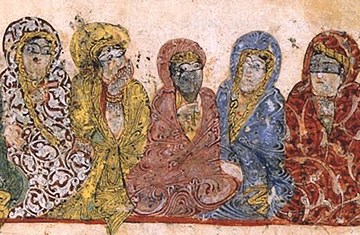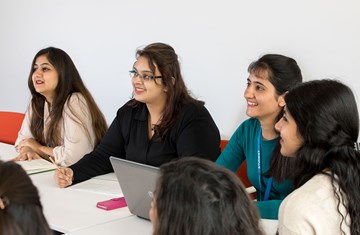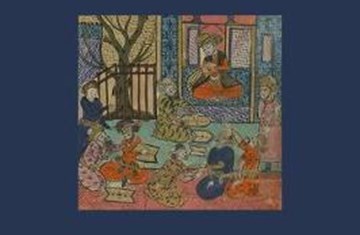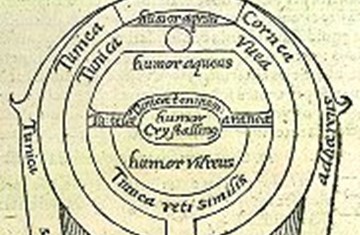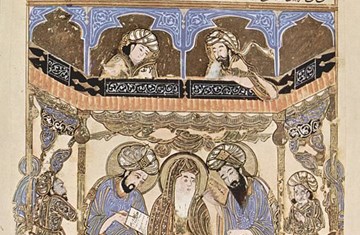Spotlighting women scholars in Ismaili studies
Women’s History Month calls for highlighting the many ways in which remarkable women enhance our world and lives. This article spotlights a few contemporary women scholars whose research and publications have contributed significantly to understanding the Shia Ismaili Muslim community. The impact of their studies has shaped how others view the Ismaili community and how members of the community see themselves. Their findings shed light on various aspects of the the Ismaili Muslim community under the guidance of their Imam-of-the-Time. This theme emerges through the work of the following female scholars, listed alphabetically by last name.
 Dr Nadia Eboo-Jamal sits on the Board of Governors at The Institute of Ismaili Studies (IIS). She is a lecturer, historian, and author who focuses broadly on the history of Muslim societies. In her monograph, Surviving the Mongols: Nizārī Quhistānī and the Continuity of Ismaili Tradition in Persia (2002), Dr Jamal presents the tenacity of the Persian Ismailis in facing the ruthless Mongol attacks. She describes the complex network of the 13th century CE Ismaili daʿwa as an enabling force for the community and follows Nizāri Quhistānī’s travelogue from Quhistān to Transcaucasia around 1280. This analysis substantiated the existence of the Ismaili daʿwa and, thus, the continuity of the Ismaili tradition in Persia through the era of Mongol rule. In recent years, Dr Eboo-Jamal has contributed significantly to the development of religious education curricular materials at the IIS.
Dr Nadia Eboo-Jamal sits on the Board of Governors at The Institute of Ismaili Studies (IIS). She is a lecturer, historian, and author who focuses broadly on the history of Muslim societies. In her monograph, Surviving the Mongols: Nizārī Quhistānī and the Continuity of Ismaili Tradition in Persia (2002), Dr Jamal presents the tenacity of the Persian Ismailis in facing the ruthless Mongol attacks. She describes the complex network of the 13th century CE Ismaili daʿwa as an enabling force for the community and follows Nizāri Quhistānī’s travelogue from Quhistān to Transcaucasia around 1280. This analysis substantiated the existence of the Ismaili daʿwa and, thus, the continuity of the Ismaili tradition in Persia through the era of Mongol rule. In recent years, Dr Eboo-Jamal has contributed significantly to the development of religious education curricular materials at the IIS.
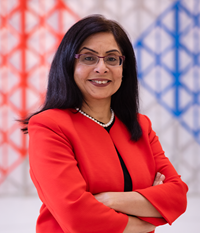 Dr Shainool Jiwa specialises in Fatimid studies and is an Associate Professor at the IIS. She also serves as a General Editor for the Living Ismaili Traditions series as well as the World of Islam series, for which she has authored two accessible publications, The Fatimids 1: The Rise of a Muslim Empire (2017) and The Fatimids 2: The Rule from Egypt (2023). In 2015, she co-edited The Shi‘i World: Pathways in Tradition and Modernity, a comprehensive collection of perspectives about Shiʿi communities worldwide and how they view themselves and articulate their teachings. In 2017, she co-edited another masterpiece, The Fatimid Caliphate: Diversity of Traditions, which offered valuable insight into the policies of tolerance established by the Fatimid Imam-caliphs towards the various religious and ethnic communities who occupied their vast empire over two centuries. Dr Jiwa continues to teach on the Institute’s graduate programmes as well as other episodic training initiatives.
Dr Shainool Jiwa specialises in Fatimid studies and is an Associate Professor at the IIS. She also serves as a General Editor for the Living Ismaili Traditions series as well as the World of Islam series, for which she has authored two accessible publications, The Fatimids 1: The Rise of a Muslim Empire (2017) and The Fatimids 2: The Rule from Egypt (2023). In 2015, she co-edited The Shi‘i World: Pathways in Tradition and Modernity, a comprehensive collection of perspectives about Shiʿi communities worldwide and how they view themselves and articulate their teachings. In 2017, she co-edited another masterpiece, The Fatimid Caliphate: Diversity of Traditions, which offered valuable insight into the policies of tolerance established by the Fatimid Imam-caliphs towards the various religious and ethnic communities who occupied their vast empire over two centuries. Dr Jiwa continues to teach on the Institute’s graduate programmes as well as other episodic training initiatives.
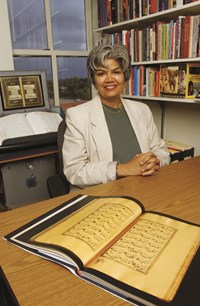 Dr Tazim Kassam is an Associate Professor at Syracuse University, Department of Religion. Her research and teaching interests include gender, ritual, devotional literature, syncretism, and the cultural heritage of Muslims, particularly in South Asia. In her book Songs of Wisdom and Circles of Dance (1995), she explores the ginan tradition of the Ismaili Muslims of the Indian Subcontinent as they emerge through the synchronicities of Hindu-Muslim ideas. She also co-edited Ginans: Texts and Contexts: Essays on Ismaili Hymns from South Asia, in which the Satpanth Ismaili Muslims of South Asia are spotlighted as a small Shi'a community that spread from India to other continents while maintaining identity through their devotional literary tradition.
Dr Tazim Kassam is an Associate Professor at Syracuse University, Department of Religion. Her research and teaching interests include gender, ritual, devotional literature, syncretism, and the cultural heritage of Muslims, particularly in South Asia. In her book Songs of Wisdom and Circles of Dance (1995), she explores the ginan tradition of the Ismaili Muslims of the Indian Subcontinent as they emerge through the synchronicities of Hindu-Muslim ideas. She also co-edited Ginans: Texts and Contexts: Essays on Ismaili Hymns from South Asia, in which the Satpanth Ismaili Muslims of South Asia are spotlighted as a small Shi'a community that spread from India to other continents while maintaining identity through their devotional literary tradition.
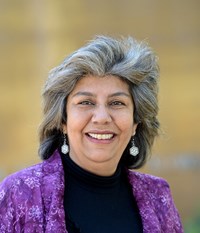 Emerita Professor Zayn Kassam is the Director of the IIS and Head of the Department of Academic Research and Publications. She has expertise in and taught courses on gender, environment, and community engagement in addition to her specialisations in Islam, methods in the study of religions, Sufism, and Islamic philosophy. She is the author of Islam (2005), the editor of Women and Islam (2010) and Women in Asian Religions (2017), amongst several other critical encyclopaedia and journal articles. Her book chapter on The Challenges of Migration and the Construction of Religious Identities: The Case of Muslims in America (2016) examines how American Muslim migrants navigate the transition of cultural, political, social, and religious landscapes through religion and religious identity. She draws attention to religious identity as a dynamic phenomenon, undergoing perpetual construction and reconstruction in response to, and through interaction with, the broader public sphere. Professor Kassam has received several awards for distinguished teaching. In addition, she has served on the board of the American Academy of Religion, as Co-editor of the Journal of Feminist Studies in Religion and is on the editorial board for the Journal of the American Academy of Religion.
Emerita Professor Zayn Kassam is the Director of the IIS and Head of the Department of Academic Research and Publications. She has expertise in and taught courses on gender, environment, and community engagement in addition to her specialisations in Islam, methods in the study of religions, Sufism, and Islamic philosophy. She is the author of Islam (2005), the editor of Women and Islam (2010) and Women in Asian Religions (2017), amongst several other critical encyclopaedia and journal articles. Her book chapter on The Challenges of Migration and the Construction of Religious Identities: The Case of Muslims in America (2016) examines how American Muslim migrants navigate the transition of cultural, political, social, and religious landscapes through religion and religious identity. She draws attention to religious identity as a dynamic phenomenon, undergoing perpetual construction and reconstruction in response to, and through interaction with, the broader public sphere. Professor Kassam has received several awards for distinguished teaching. In addition, she has served on the board of the American Academy of Religion, as Co-editor of the Journal of Feminist Studies in Religion and is on the editorial board for the Journal of the American Academy of Religion.
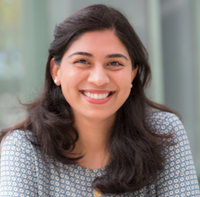 Dr Shenila Khoja-Moolji is an Associate Professor of Muslim Societies at Georgetown University. Her research interests involve Muslim populations in South Asia and the North American diaspora from the lens of gender, race, religion, and power in transnational contexts. Her books, entitled Forging the Ideal Educated Girl (2018) and Sovereign Attachments (2021) received several high-calibre awards. Her latest book, Rebuilding Community: Displaced Women and the Making of a Shia Ismaili Muslim Sociality (2023) is a tribute to the transnational lives of Ismaili Muslim women and their journeys from colonial India to East Africa and then to North America. Dr Khoja-Moolji writes women into history as heroines and catalysts of community-building through their everyday interaction and interests in each other, no matter where they live.
Dr Shenila Khoja-Moolji is an Associate Professor of Muslim Societies at Georgetown University. Her research interests involve Muslim populations in South Asia and the North American diaspora from the lens of gender, race, religion, and power in transnational contexts. Her books, entitled Forging the Ideal Educated Girl (2018) and Sovereign Attachments (2021) received several high-calibre awards. Her latest book, Rebuilding Community: Displaced Women and the Making of a Shia Ismaili Muslim Sociality (2023) is a tribute to the transnational lives of Ismaili Muslim women and their journeys from colonial India to East Africa and then to North America. Dr Khoja-Moolji writes women into history as heroines and catalysts of community-building through their everyday interaction and interests in each other, no matter where they live.
 Dr Arzina Lalani served as a researcher, writer, and lecturer at the IIS. In her monograph, Early Shī‘ī Thought: The Teachings of Imam Muḥammad al-Bāqir (2000), which won prestigious literary awards and has been translated into several languages, Dr Lalani explores Imam al-Bāqir’s pivotal contributions during the formative period of Islamic thought. These contributions influenced the development of Shīʿī law, theology, and religious practice. The study draws particular attention to the formulation of the Shīʿī doctrine of imamate, in light of the political backdrop of Islam a century after the passing of the Prophet. Dr Lalani is also the editor and translator of a new Arabic edition and English translation of Aḥmad b Ibrāhīm al-Naysābūrī's Kitāb ithbāt al-imāma, published by the IIS as Degrees of Excellence: A Fatimid Treatise on Leadership in Islam (2009). Beyond this, she has published numerous journal articles as well.
Dr Arzina Lalani served as a researcher, writer, and lecturer at the IIS. In her monograph, Early Shī‘ī Thought: The Teachings of Imam Muḥammad al-Bāqir (2000), which won prestigious literary awards and has been translated into several languages, Dr Lalani explores Imam al-Bāqir’s pivotal contributions during the formative period of Islamic thought. These contributions influenced the development of Shīʿī law, theology, and religious practice. The study draws particular attention to the formulation of the Shīʿī doctrine of imamate, in light of the political backdrop of Islam a century after the passing of the Prophet. Dr Lalani is also the editor and translator of a new Arabic edition and English translation of Aḥmad b Ibrāhīm al-Naysābūrī's Kitāb ithbāt al-imāma, published by the IIS as Degrees of Excellence: A Fatimid Treatise on Leadership in Islam (2009). Beyond this, she has published numerous journal articles as well.
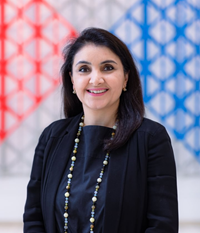
Dr Gurdofarid Miskinzoda is the Head of the Shi‘i Studies Unit at the IIS. Her areas of focus are Muslim historical and literary tradition, Shiʿi Islam, History of Islam until 17th century, Classical Arabic and Persian Literature. She co-edited The Study of Shiʿi Islam: History, Theology and Law (2014), a collection of papers organised under the themes of history, the Qurʾan and its Shiʿi interpretations, ḥadīth, law, authority, theology, rites and rituals, and intellectual traditions and philosophy. She has two forthcoming titles: a monograph entitled Identity, doctrine and the writing of history, and Narratives of the Life of Muhammad: Redefining Sīra Literature. In addition to having published several journal and encyclopaedia articles, Dr Miskinzoda also teaches on IIS’ graduate programmes.
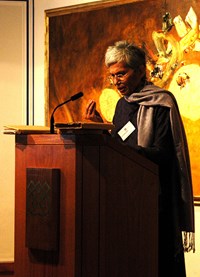
Zawahir Moir (d. 2024), whose efforts towards the Ismaili scholarship pre-date the establishment of the IIS, was a scholar of Khojki script, South Asian Ismaili traditions, and Gināns. Her seminal work in cataloguing the Khojki manuscripts created pathways for future ginānic scholars to pursue their academic search, thereby enriching the overall study of Ismaili devotional literature. Her publications shed light on the work and context of the Satpanth pirs (saint-teachers), and the circumstances that led to the migration of the first Aga Khan to India. She co-authored Ismaili Hymns from South Asia: An Introduction to the Ginans (2001), which was a groundbreaking intervention in the study of the Satpanth literature. Zawahir’s contributions have left an indelible mark on the study of the Indian Ismaili tradition.

Dr. Nacim Pak-Shiraz sits on the Board of Governors at the IIS. She is the head of Islamic and Middle Eastern Studies at the University of Edinburgh. Her areas of inquiry include visual cultures, constructions of masculinity, and the engagement of religion and film. In her book, Shi‘i Islam in Iranian Cinema: Religion and Spirituality in Film (2018), she showcases how the Iranian film directors impress upon the religious and historical narratives of culture and society. Through her inquiry, she has created a curiosity and dialogue in the public arena about the various ways that Shi'ism is represented on screen, what avenues the medium of film offers the Iranian society, and how films provide a platform to express Iranian and Muslim identities after three decades under Islamic rule.
These are but a few of the many women scholars who have worked tirelessly in the field of Ismaili studies. We are grateful to these women who are trailblazers in their curiosities and contributions.
Image: STEP and GPISH Students. Photo by Jonathan Goldberg.
Khuwaja, Shireen. "Spotlighting Women Scholars in Ismaili Studies" Lifelong Learning, The Institute of Ismaili Studies, 18 March 2024, https://www.iis.ac.uk/learning-centre/scholarly-contributions/lifelong-learning-articles/women-in-ismaili-studies/
Khuwaja, Shireen. (2024, March 18) Spotlighting Women Scholars in Ismaili Studies. Lifelong Learning. https://www.iis.ac.uk/learning-centre/scholarly-contributions/lifelong-learning-articles/women-in-ismaili-studies/
Khuwaja, Shireen. "Spotlighting Women Scholars in Ismaili Studies" Lifelong Learning (blog), The Institute of Ismaili Studies, March 18, 2024. https://www.iis.ac.uk/learning-centre/scholarly-contributions/lifelong-learning-articles/women-in-ismaili-studies/.
Khuwaja, Shireen. 2024. "Spotlighting Women Scholars in Ismaili Studies" Lifelong Learning (blog), The Institute of Ismaili Studies, March 18. https://www.iis.ac.uk/learning-centre/scholarly-contributions/lifelong-learning-articles/women-in-ismaili-studies/.



